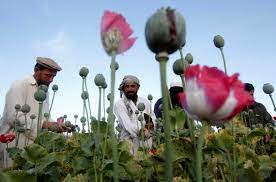Earlier this month, the highest leader of the Taliban, Hibatullah Akhundzada, announced the official ban on Poppy cultivation, along with the production, distribution, and use of other illegal drugs. He warned that “If anyone violates the decision, the harvest will be destroyed immediately, and violators will be treated according to sharia law”. This step is widely seen as an effort to rehabilitate the sluggish global image of the Global Taliban, gaining international recognition and easing sanctions.
There are several questions about the will and ability of the Taliban to uphold this new prohibition. If history is any guide, we must take it in their words: The last time the Taliban forbids illegal drugs in 2000, Poppy cultivation has dropped more than 90 percent in one year.
The latest prohibition on the Taliban is likely to have a number of significant political, economic and social implications. There are concerns, for example, about the economic impact on Afghan Poppy farmers and extensive illegal supply chains. According to the UN office on drugs and crime, the Afghan heroin economy produced around $ 1.8 billion to $ 2.7 billion in 2021, a large amount for such poor countries.
It is possible that some farmers will continue to grow the factory, regardless of the prohibition of the Taliban – Opium remains one – only a reliable source of income in a country that was damaged by war for decades – and others tend to supply opium to anticipate price increases. However, the Taliban will find it difficult to manage the loss of an industry embedded in the national economy so that at one point 32 percent of the country’s gross domestic product.
Apart from the domestic impact that has the potential to damage, the collapse of the Afghan heroin trade can also deliver new era of drug trafficking in Europe and Britain, where most of the heroin sourced from Afghanistan is consumed. Until now, most countries in Europe have been avoided from the destruction caused by Fentanyl Proliferation and other synthetic drugs in the US. According to the European Monitoring Center for Drugs and Drug Addiction, Europe and Britain have averaged several hundred overdose deaths involving Fentanyl over the past few years – not an insignificant amount, but far from tens of thousands dying every year in us.
No one knows exactly why Fentanyl failed to rooted in Europe and Britain. Some have suggested the supply of heroin with abundant high purity from Afghanistan has reduced the need to fake it with strong synthetic opioids. Others have quoted Europe and the use of more conservative painkillers in the UK. Whatever the reason, prohibiting heroin production in Afghanistan can trigger the entry of synthetic opioids that have long been feared by officials in Europe and Britain.
There is no guarantee that Fentanyl will dominate drug trafficking in Europe and Britain like in the US. The regional drug market is very separate; The new trend in one place does not always follow elsewhere. The cracked epidemic from the 1980s did not apply in Europe in the same way in the US, for example, there was also no Europe who saw the long-awaited arrival of metamfetamine.


No Comments Yet